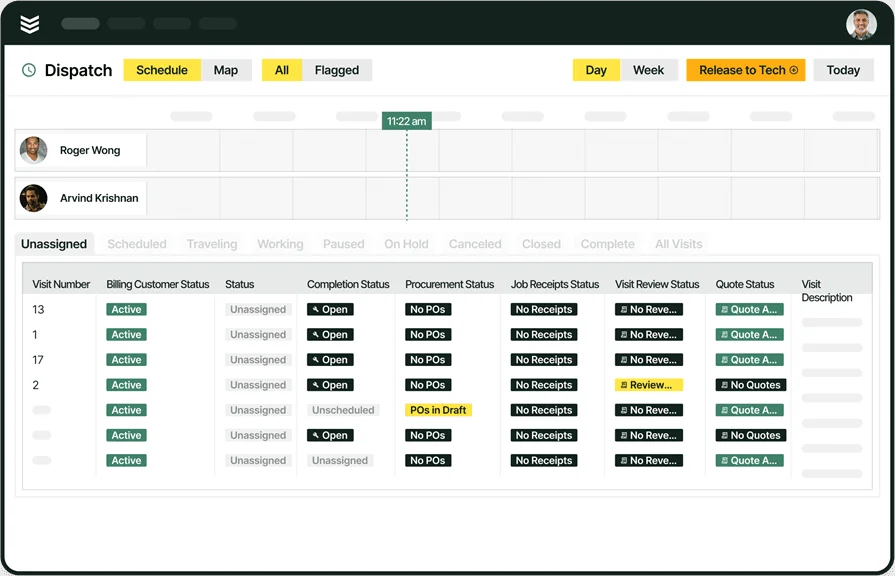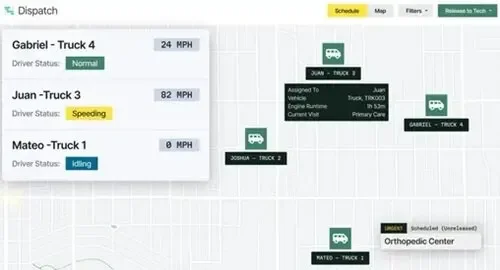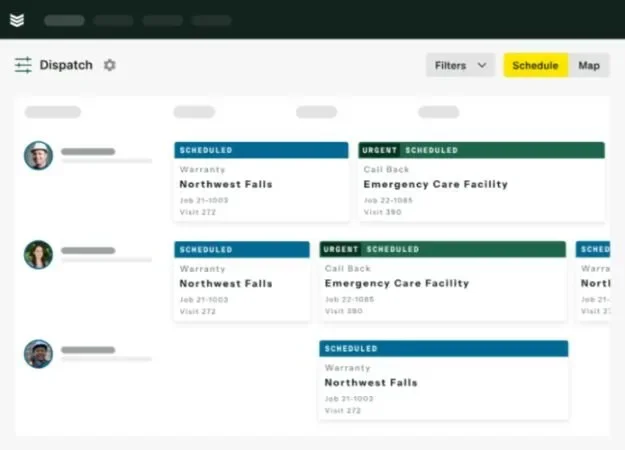In the HVAC industry, having the right HVAC dispatch software keeps your team on track and your jobs running smoothly. From managing technician schedules to ensuring no service call falls through the cracks, it’s the backbone of an efficient operation.
In this guide, we’ll cover what to look for, the top tools for every type of HVAC business, and how to choose the perfect fit for your team.
- Choosing the right HVAC dispatch software for your needs
- 6 key features to look for in an HVAC dispatching software
- Best HVAC dispatch software for commercial
- Best HVAC dispatch software for residential
- Best HVAC dispatch software for general contractors
- Other notable HVAC dispatch software solutions
- 5 benefits of using dispatch software for HVAC services
- 7 important HVAC dispatch software FAQs answered
Let’s start by exploring how to choose the right HVAC dispatch software for your business.
Choosing the right HVAC dispatch software for your needs
Choosing the best HVAC dispatch software means understanding what works for your business. The right tool should help you manage schedules, prioritize jobs, and communicate seamlessly with on-site technicians. Start by asking these key questions:
- Job Volume: How many service calls do you handle daily? Does the software support high-volume scheduling and dispatching?
- Technician Tracking: Can the software provide real-time updates on technician locations and job statuses?
- Customer Communication: Does it allow you to keep customers updated on job progress and technician arrival times?
- Workflow Automation: Can it handle recurring maintenance schedules, route optimization, and automated task assignments?
- Features: What are the must-have features—real-time technician tracking, automated scheduling, or route optimization—that solve your biggest pain points?
Once you’ve outlined your needs and priorities, it’s time to zero in on the features that make a real difference. Let’s break down the key features to look for in HVAC dispatch software.
6 key features to look for in an HVAC dispatching software
The best HVAC dispatch software should do more than just schedule jobs. It should solve the everyday pain points of managing technicians, improving efficiency, and boosting customer satisfaction. Whether you’re looking for an HVAC scheduling app or a full-service dispatching platform, here are the key features that make all the difference:
1. Real-time dispatching
Assign jobs instantly and send details directly to your HVAC technicians via a mobile app. This eliminates delays, miscommunication, and unnecessary trips back to the office. HVAC service calls are often urgent—whether it’s a system breakdown in extreme weather or a last-minute maintenance request. With real-time dispatching, techs receive job details on the go, ensuring faster response times and better service.
2. Route optimization
Efficiently plan technician routes to save time, reduce fuel costs, and get to job sites faster. HVAC companies often handle multiple service calls in a day, and poor routing leads to wasted fuel, longer travel times, and missed appointments. Route optimization, a key feature in many HVAC scheduling software solutions, accounts for traffic, job urgency, and technician location, ensuring they take the fastest path to each job while maximizing daily service capacity.
3. Customer hierarchies
Organize client information for businesses with multiple locations. Many HVAC contractors service large commercial properties, property management companies, or multi-site businesses. With customer hierarchies, you can track all buildings, equipment, and contacts under a single client account, making it easier to schedule routine maintenance, log past repairs, and ensure consistent service.
Deep Dive
For more advanced dispatching workflows, check out our guide to scheduling & dispatching.
4. Mobile accessibility
Technicians can view job details, update progress, and communicate with dispatchers from anywhere using a mobile field service app. HVAC work requires techs to be on-site, often in basements, rooftops, or remote locations. With mobile access, they can instantly check service history, upload photos of completed work, and get live updates—all without returning to the office, reducing downtime and improving efficiency.
5. Full service history
Keep track of all past work performed for a client, including notes, repairs, and recommendations. HVAC technicians often work on complex systems where knowing past repairs or part replacements is crucial. This feature helps techs arrive fully prepared with the right tools and parts, reducing time spent diagnosing issues and ensuring a more seamless service experience. Need to manage invoicing alongside dispatching? HVAC billing software integrates invoicing and job tracking for a complete field service solution.
6. Job completion checklists
Ensure every job is done right the first time with customizable checklists. HVAC installations and repairs involve multiple steps—checking refrigerant levels, testing airflow, and ensuring electrical connections are secure. These checklists help technicians follow standardized procedures, reducing errors, avoiding callbacks, and improving service quality for both residential and commercial clients.
Expert Tip
Looking to streamline communication further? Use an HVAC dispatcher script to ensure calls and job assignments follow a structured workflow.
Other valuable dispatching features for HVAC service companies
- Centralized Customer Information: Store and access all client data in one place to streamline operations.
- Drag-and-Drop Scheduling: Easily assign jobs with an intuitive interface that helps you avoid scheduling conflicts.
- Predictive Analytics: Use data to forecast future maintenance needs and recommend services proactively.

Unlock data-driven insights
See how to accelerate business growth with a field service dispatch software.
Best HVAC dispatch software for commercial: BuildOps
BuildOps is purpose-built for commercial HVAC businesses, designed to streamline complex operations. Its real-time dispatching, intuitive drag-and-drop scheduling, and customer hierarchy management make it an essential tool for busy teams handling high volumes of service calls. With BuildOps, your technicians stay connected, and your jobs stay on schedule.
How Pricing Works: To explore features and discover a solution that meets your needs, we provide weekly live demos and the opportunity to schedule a customized session.
Features Beyond Dispatching:
- Customizable Invoicing and Billing: Simplify your back office by automating payment processing and generating detailed invoices tailored to your needs.
- Integrated Reporting: Track job performance, technician productivity, and overall operations in real- time with comprehensive analytics.
- Asset Management: Manage customer assets efficiently, tracking equipment, service histories, and upcoming maintenance needs.
What Sets It Apart for Commercial: Designed to manage the complexity of commercial HVAC work, BuildOps aggregates real-time dispatching, invoicing and billing, and strong scheduling features.

Explore BuildOps dispatch software
Streamline commercial HVAC operations and dispatch the right tech to the job.
Best HVAC dispatch software for residential: Kickserv
Image Source: Kickserv
Kickserv is designed for small home service businesses, focusing on simplicity and efficiency. It integrates with tools like QuickBooks and Mailchimp, making it easy to manage payments, estimates, and communication all in one platform. However, its advanced features are locked behind higher-tier pricing plans, which may not suit businesses with tighter budgets.
How Pricing Works: Kickserv offers tiered pricing with core features available at the entry level and more advanced capabilities at premium levels.
What Sets It Apart for Residential: Kickserv’s simplicity and integrations make it ideal for small teams managing straightforward residential service calls.
Learn more about how you can manage your team with Kickserv’s residential HVAC software.
Best HVAC dispatch software for general contractors: FieldEdge
Image Source: FieldEdge
FieldEdge caters to contractors managing HVAC along with other trades like plumbing or electrical. It offers a centralized hub for dispatching, customer management, and invoicing. However, its complexity may be overwhelming for smaller teams with fewer resources to train on the system.
How Pricing Works: FieldEdge’s pricing varies based on the number of users, with scalable options for larger teams.
Features Beyond Dispatching: Provides robust inventory tracking and marketing tools for generating leads and upselling services.
What Sets It Apart for General Contractors: FieldEdge’s multi-service capabilities and advanced reporting make it ideal for contractors handling diverse trades.
Discover how FieldEdge simplifies contractor scheduling & dispatching.
Other notable HVAC dispatch software solutions
The right HVAC dispatch software depends on your business’s specific needs. Some tools excel for small-scale operations, others shine in residential work, and a few focus on fleet management and logistics. Below are a few notable options and what makes them stand out.
Samsara
Image Source: Samsara
Samsara focuses on dispatching and fleet management, making it a great option for HVAC companies with multiple vehicles and technicians on the road. It offers GPS tracking, route optimization, and real-time updates, but its fleet-oriented focus may not be ideal for businesses needing comprehensive office tools.
How Pricing Works: Samsara operates on a subscription model with additional costs for hardware like GPS trackers.
Features Beyond Dispatching: Includes fleet monitoring, vehicle diagnostics, and driver safety tools.
What Sets It Apart: Samsara is perfect for HVAC companies that prioritize efficient fleet management and route optimization.
Jobber
Image Source: Jobber
Jobber is designed for small and midsized service businesses, offering features like job scheduling, invoicing, and team management. While it’s user-friendly, its functionality may be limited for larger operations or companies managing more complex workflows.
How Pricing Works: Jobber offers tiered pricing starting at an affordable entry level, scaling up for premium features.
Features Beyond Dispatching: Includes client management and customizable invoicing tools.
What Sets It Apart: Jobber is praised for its ease of use and quick setup, perfect for small teams.
Housecall Pro
Image Source: Housecall Pro
Housecall Pro focuses on simplifying operations for residential service providers. It offers intuitive scheduling, online booking, and automated reminders for customers. However, it lacks the robust features required by larger commercial HVAC businesses.
How Pricing Works: Offers affordable pricing plans with options to add extra features like automated customer reviews.
Features Beyond Dispatching: Provides an online customer booking system and automated appointment reminders.
What Sets It Apart: Its customer-friendly features like online booking make it a standout for residential service providers.
How Does It Compare to BuildOps?: Find out in our head to head breakdown of their features here.
5 benefits of using dispatch software for HVAC services
Running an HVAC business is full of moving parts—literally. From managing technician schedules to keeping customers happy, dispatch software can simplify the chaos and help your team work smarter. Here are the key benefits you can expect:
1. Faster job scheduling
Dispatch software automates scheduling, ensuring HVAC technicians are assigned jobs quickly based on availability, proximity, and skill set. Whether it’s an emergency AC repair in the middle of summer or a routine maintenance check, the right tech gets dispatched immediately, minimizing downtime and keeping service calls on track.
2. Optimized routes
With route optimization, HVAC technicians spend less time driving and more time servicing units. The software considers traffic, job priority, and technician location to create the most efficient routes—helping teams hit more service calls per day while reducing fuel costs and vehicle wear. This is especially useful for high-priority jobs, like restoring heating in freezing temperatures.
3. Real-time communication
Keep office staff and field technicians connected with instant updates. Dispatch software sends job details, customer history, and last-minute changes directly to a technician’s mobile device. Whether a tech needs a part replacement approval or an urgent job reassignment, everything is handled in real-time—without endless phone calls.
4. Improved customer satisfaction
HVAC emergencies can’t wait. Dispatch software allows you to provide accurate arrival times, send automated appointment reminders, and update customers when a technician is en route. This level of transparency builds trust and keeps customers informed—whether it’s a commercial client waiting on a critical refrigeration repair or a homeowner needing urgent furnace service.
5. Better resource management
A clear view of technician availability helps distribute workloads efficiently. HVAC businesses often juggle planned maintenance, emergency calls, and installation projects. Dispatch software ensures no technician is overbooked or sitting idle, helping teams maximize billable hours while preventing burnout.

Check out our dispatch tool
See how BuildOps can help you effectively manage your field crews.
7 important HVAC dispatch software FAQs answered
HVAC dispatch software often raises questions for contractors looking to improve their operations. From understanding how it works to knowing whether it’s right for your business, here are the answers to the most common questions about HVAC dispatch software.
1. What is HVAC dispatching software?
HVAC dispatching software is a digital tool that helps assign and manage service calls. It connects office staff with technicians in the field, enabling real-time scheduling, route optimization, and communication. By automating manual processes, it ensures efficiency and faster service delivery.
2. What’s the difference between HVAC dispatching & HVAC scheduling?
HVAC dispatching focuses on assigning technicians to jobs, ensuring they arrive on-site prepared and on time. HVAC scheduling, on the other hand, involves organizing service calls based on availability, urgency, and workload. Together, they streamline the entire service process from planning to execution.
Deep Dive
For a deeper dive, read our guide to HVAC scheduling and dispatching.
3. What does an HVAC dispatcher do?
An HVAC dispatcher assigns technicians to service calls, manages their schedules, and ensures they have the tools and information needed to complete jobs. Dispatchers also act as the bridge between customers and technicians, updating both parties on progress and addressing any issues that arise.
Deep Dive
Read more in our comprehensive guide on HVAC dispatchers.
4. How does dispatch software for HVAC work?
Dispatch software automates the coordination process. It:
- Tracks technician availability and location.
- Matches jobs with the right technician based on skills and proximity.
- Optimizes routes to reduce travel time.
- Provides real-time updates to technicians and office staff.
This ensures faster response times, fewer delays, and better resource management.
5. How much does HVAC dispatching software cost?
Most providers offer flexible payment structures to fit different needs, including:
- Subscription Plans: Pay monthly or annually, with fees typically scaling based on the number of users and the feature set.
- Tiered Pricing: Choose from basic, standard, or premium packages, depending on the tools and functionality your business requires.
- Custom Quotes: Ideal for larger businesses or those with unique needs, offering tailored solutions that include advanced features like GPS tracking or analytics.
This flexibility ensures businesses of all sizes can find a solution that aligns with their budget and operational goals.
6. Who needs an automated HVAC dispatch and scheduling software?
HVAC companies managing multiple technicians, handling a high volume of service calls, or looking to optimize operations benefit most from dispatch software. This includes commercial contractors, residential service providers, and general contractors juggling diverse job requirements.
7. Should I get a stand-alone HVAC dispatch program, or an FSM software that has dispatching capabilities?
It depends on your business needs. A stand-alone HVAC dispatch program is ideal for smaller teams with limited needs. For businesses requiring a complete solution—covering invoicing, inventory management, and reporting—FSM software with dispatching capabilities is a better choice.
Finding the right HVAC dispatch software can feel overwhelming with so many options on the market, but the tools we’ve covered address the challenges contractors face every day—managing schedules, keeping technicians on the move, and ensuring customers are satisfied.
What sets BuildOps apart? It’s built for contractors who need more than just basic features. From real-time dispatching to advanced customer hierarchies, scheduling, and invoicing, BuildOps brings it all together in one seamless platform. Many of the features we’ve discussed—like AI-powered notetaking and centralized service histories—aren’t standard in most tools, but they’re included in BuildOps.

See BuildOps in action.
Simplify your operations and dispatch the right HVAC tech to jobs.







